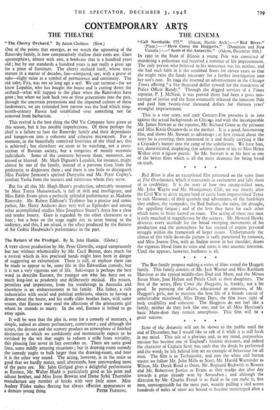CONTEMPORARY ARTS
THE THEATRE
"The Cherry Orchard." By Anton Chelchov. (New.)
ONE of the points that emerges, as we watch the uprooting of the Ranevsky family, is how comparatively shallow their roots are. Gaev apostrophises, almost with awe, a bookcase that is a hundred years old ; but by our standards a hundred years is not really a great age for a piece of furniture. The cherry orchard itself, whose trees mature in a matter of decades, has—compared, say, with a grove of oaks—slight value as a symbol of permanence and continuity. The old valet, Firs, was not so long ago a serf. We can surmise—for we know Lopahin, who has bought the house and is cutting down the orchard—what will happen to the place when the Ranevskys have gone ; but when we look back two or three generations into the past, through the uncertain pretensions and the imported culture of these landowners, we are reminded how narrow was the lead which nine- teenth-century Russia had established over something not far removed from barbarism.
This revival is the best thing the Old Vic Company have given us this season but it has notable imperfections. Of these perhaps the chief is a failure to fuse the Ranevsky family and their dependants and hangers-on into a coherent and cohesive microcosm. For a moment, in the beautifully contrived festivities of the third act, this is achieved ; but elsewhere we seem to be watching, not a cross- section of Russian society, but a congeries of mainly eccentric individuals. Some of the contrasts between them, moreover, are missed or blurred. Mr. Mark Dignam's Lopahin, for instance, might almost be one of the family, instead of a parvenu risen from the proletariat to dispossess them; there is too little to distinguish Miss Pauline Jameson's spirite Dunyasha and Mr. Peter Copley's insolent Yasha from the masters and mistresses whom they serve.
But for all this Mr. Hugh-Hunt's production, admirably mounted by Miss Tanya Moiseiwitsch, is full of skill and intelligence, and Miss Edith Evans gives a perfectly splendid performance as Madame Ranevsky. Mr. Robert Eddison's Trofimov has a precise and comic pathos, Mr. Harry Andrews does very well as Epihodov and among other accomplished studies Miss Josephine Stuart's Anya has a clear and tender beauty. Gaev is regarded by the other characters as a bore ; but a bore on the stage ought not to seem boring to the audience, and this, I am afraid, is the effect produced by the flatness of Sir Cedric Hardwicke's performance in the part.


































 Previous page
Previous page